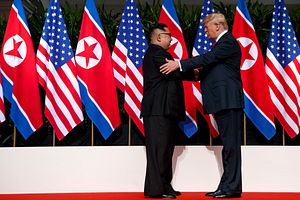In the late hours of June 12, it looked as if the United States and North Korea succeeded in making substantial progress on the road to a brand new bilateral relationship. North Korean leader Kim Jong Un committed his country to work toward denuclearization, and U.S. President Donald Trump returned the favor by agreeing to proceed toward the establishment of a peace regime on the Korean Peninsula and a “new” and more prosperous U.S.-North Korea relationship.
More than three months later, however, there has been little to no progress on any of the major points endorsed by both leaders in Singapore. Pyongyang remains highly resistant to additional denuclearization measures without the Trump administration first granting diplomatic concessions of its own. And yet despite the conundrum on the nuclear file, inter-Korean peace and reconciliation talks are moving at a brisk pace.
This week, after a third summit meeting between Kim and South Korean President Moon Jae-in, both leaders unveiled a declaration committing one another to the kinds of demilitarization measures that could very well enhance the opportunities for an eventual peace on the Korean Peninsula — a peace that would benefit Washington as much as it would benefit Seoul and Pyongyang.
Trump therefore has a choice to make. He could either do what previous administrations have done and walk away from the process entirely — betting on the naive hope that a return to “fire and fury” threats and maximum economic pressure will compel Pyongyang into surrender. Or he could continue to buck the very foreign policy establishment in Washington he campaigned against during his run for the White House by agreeing to a second summit with Kim and elevating peace on the Korean Peninsula to the same level as denuclearization. The latter option would be an unconventional move befitting an unconventional president and an opportunity for Trump to reorient the negotiations toward the United States’ ultimate foreign policy objective: peace for the region and security for the American people.
In foreign policy, actions often speak louder than words. And notwithstanding the suspension of nuclear and missile tests and the transfer of U.S. war remains, the actions of Kim reveal a man who has yet to make the strategic decision to part with his nuclear weapons.
Indeed, the Kim dynasty has not withstood nine rounds of increasingly tough and comprehensive U.N. economic sanctions and near-complete diplomatic isolation over the last quarter-century to simply give up its entire nuclear program based on a few open-ended promises of diplomatic and economic sweeteners. In Kim’s calculation, the benefits of an operational nuclear weapons program — foremost the preservation of his regime from foreign attack or subterfuge — have been worth the cost in belt-tightening and reputational damage.
For Kim Jong Un, like his father and grandfather before him, a nuclear weapons capability is the great equalizer. It is highly fanciful that Kim would trade this equalizer away regardless of how many concessions Washington promised. Kim has internalized the lessons of Libya’s Muammar Qaddafi quite well: don’t trust anything foreign powers have to say, and above all, don’t gamble away your life insurance policy in exchange for commitments that may not be kept in the future.
U.S.-North Korea diplomacy is now in a three-month holding pattern. There is a way for the Trump administration to rejuvenate the diplomatic initiative, but it will require a bold move from the president himself.
If Trump wants to make the most of the opportunity in front of him, he should separate negotiations on the North Korean nuclear problem from discussions about a wider peace and reconciliation on the Korean Peninsula. To date, Washington is taking the exact opposite approach, predicating de-escalation and dialogue about a broader peace with Pyongyang to its unequivocal surrender on the nuclear issue. Predictably, the result has been diplomatic deadlock.
What Washington has too frequently lost sight of is that denuclearization is a means, not an end, to the paramount U.S. policy goal: a regional peace in East Asia. While North Korea’s transition to a non-nuclear weapons state is certainly the ideal, it is not pertinent to securing the U.S. homeland. The United States will continue to deter North Korea due to its nuclear might and military capabilities. To hold the potential for peace and stability in East Asia hostage to a non-nuclear Kim regime is nonsensical.
Despite what Washington interventionists advise, Trump should proceed with planning another meeting with his North Korean counterpart. But instead of talking exclusively about nuclear weapons, the White House should make clear that the U.S. strongly approves of South Korean President Moon Jae-in’s strategy of rapprochement. A separate track of negotiations with Pyongyang should be opened dealing with what both the United States and the North can do to curtail misunderstandings, promote durable and permanent lines of communication between their capitals and their military staffs, and lessen the possibility of a senseless armed confrontation that could leave millions of people dead (including the 28,500 U.S. troops in South Korea) and the entire Korean Peninsula destroyed.
The Trump administration needs to remember that the United States is not running out of time. Deterrence and strategic dialogue was an effective combination for Washington throughout the Cold War, when the U.S. was containing a Soviet Union far more powerful than North Korea can ever hope to be. Washington has deterred a nuclear North Korea for the last decade, and all evidence indicates it can continue to do so over the long-term.
If Trump can facilitate a dialogue toward a more stable peace, it would be an unprecedented achievement. Denuclearizing North Korea can wait. What can’t wait is a peace on the Korean Peninsula that would shut the door to a reckless preventative war.
Daniel DePetris is a fellow at Defense Priorities.

































